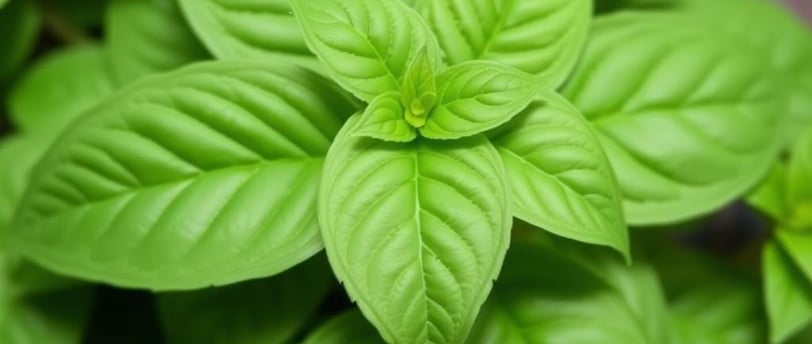Holy Basil for Heart Health: The Sacred Herb That Reduces Stress and Supports Cardiovascular Function
❤️HEART HEALTH


Holy basil, scientifically known as Ocimum sanctum and often referred to as Tulsi, has been revered for centuries in traditional medicine systems such as Ayurveda. Its aroma fills the air in many Indian households, heralded not just for its culinary use but also for its numerous health benefits. Recent research highlights its potential role in enhancing heart health, particularly in managing stress and supporting cardiovascular function. This article will delve deep into the forms available, recipes, dosage, side effects, precautions, and the scientific basis that underpins the numerous claims surrounding this sacred herb.
Forms Available
Holy basil comes in various forms, each with unique benefits and applications:
Fresh Leaves: The most potent form, these can be easily added to teas, salads, or used as a garnish in various dishes.
Dried Herbs: Available in packets, dried holy basil can be used for brewing teas or as a flavor enhancer in recipes.
Essential Oil: Extracted from the leaves, this concentrated form can be used in aromatherapy to reduce stress and enhance mood.
Powder: Ground holy basil leaf powder can be added to smoothies, herbal capsules, or consumed directly with water.
Tea Bags: Ready-to-use tea bags make it easy to brew holy basil tea, combining convenience with health benefits.
Liquid Extracts and Tinctures: These are concentrated forms of holy basil that provide higher dosages in smaller volumes, suitable for those seeking targeted health benefits.
Recipes Incorporating Holy Basil
Integrating holy basil into your daily diet is simple and delicious. Here are a couple of recipes that highlight its versatility:
Holy Basil Tea
Ingredients:
1 cup of fresh holy basil leaves (or 1-2 tablespoons of dried basil)
2 cups of water
Honey or lemon (optional)
Instructions:
Boil the water in a pot.
Add the holy basil leaves and reduce the heat.
Simmer for about 5-10 minutes.
Strain the liquid into a cup and add honey or lemon to taste.
Holy Basil Smoothie
Ingredients:
1 banana
1 cup spinach
1 tablespoon holy basil powder
1 cup almond milk
Honey to taste
Instructions:
Combine all ingredients in a blender.
Blend until smooth.
Pour into a glass and enjoy!
These recipes not only provide a refreshing taste but also unleash the myriad health benefits of holy basil.
Dosage: How Much Holy Basil to Take?
For heart health and stress reduction, the dosage of holy basil may vary based on the form you choose:
Fresh Leaves: About 10-15 leaves daily.
Dried Leaves/Tea: 1-2 teaspoons of dried holy basil per cup of water.
Powder: Typically, 1-2 grams per day or as recommended by a healthcare provider.
Tinctures and Extracts: Follow the manufacturer's instructions, as concentration levels can differ significantly.
Important Note:
As with any supplement, it’s advisable to consult with a healthcare provider for personalized recommendations and to avoid any potential interactions with medications.
Side Effects and Precautions
Though generally considered safe, holy basil may cause side effects in certain individuals. Common side effects include:
Mild gastrointestinal disturbances (nausea or diarrhea)
Allergic reactions (in rare cases)
Potential impact on blood sugar levels, which may pose risks for diabetics
Precautions:
Pregnancy and Breastfeeding: Women who are pregnant or breastfeeding should exercise caution and consult a healthcare provider before consuming holy basil.
Surgery: Holy basil may affect blood sugar control; it is recommended to stop taking it at least two weeks prior to scheduled surgery.
Medication Interactions: Be mindful of potential interactions with blood thinners, anti-diabetic drugs, and medications for high blood pressure.
Scientific Basis: The Research Behind Holy Basil
The health benefits of holy basil, particularly related to heart health, are not merely anecdotal but are backed by scientific research. Studies have shown that holy basil contains compounds such as eugenol, rosmarinic acid, and other phytochemicals that have antioxidant, anti-inflammatory, and adaptogenic properties.
Stress Reduction
Research indicates that holy basil can help modulate the body's response to stress. A study conducted on individuals experiencing mental stress showed that consuming holy basil extract led to lower levels of cortisol—a stress hormone—thereby supporting better heart health. Chronic stress is a known risk factor for cardiovascular diseases, so managing stress can be a proactive measure in heart health.
Cardiovascular Benefits
Several animal and human studies suggest that holy basil may lower cholesterol and triglyceride levels, improve blood circulation, and help regulate blood pressure. Its antioxidant properties fight oxidative stress, a culprits in heart disease development.
Conclusion
Holy basil is indeed a sacred herb worthy of its revered status. As evidence mounts regarding its role in reducing stress and promoting cardiovascular health, incorporating it into your lifestyle may contribute to overall well-being. Whether in the form of a soothing tea, a smoothie, or herbal supplements, holy basil offers numerous options to enhance your health naturally. However, always remember to discuss with your healthcare provider before making any significant changes to your health regimen. Enjoy the journey of exploring this ancient herb while prioritizing your heart's health!
